- 相关推荐
关于春节英语手抄报素材
在平时的学习、工作中,大家都知道手抄报吧,手抄报是传递信息,宣传知识的有效工具。那什么样的手抄报才是大家都称赞的呢?下面是小编帮大家整理的关于春节英语手抄报素材,希望能够帮助到大家。
春节英语手抄报素材
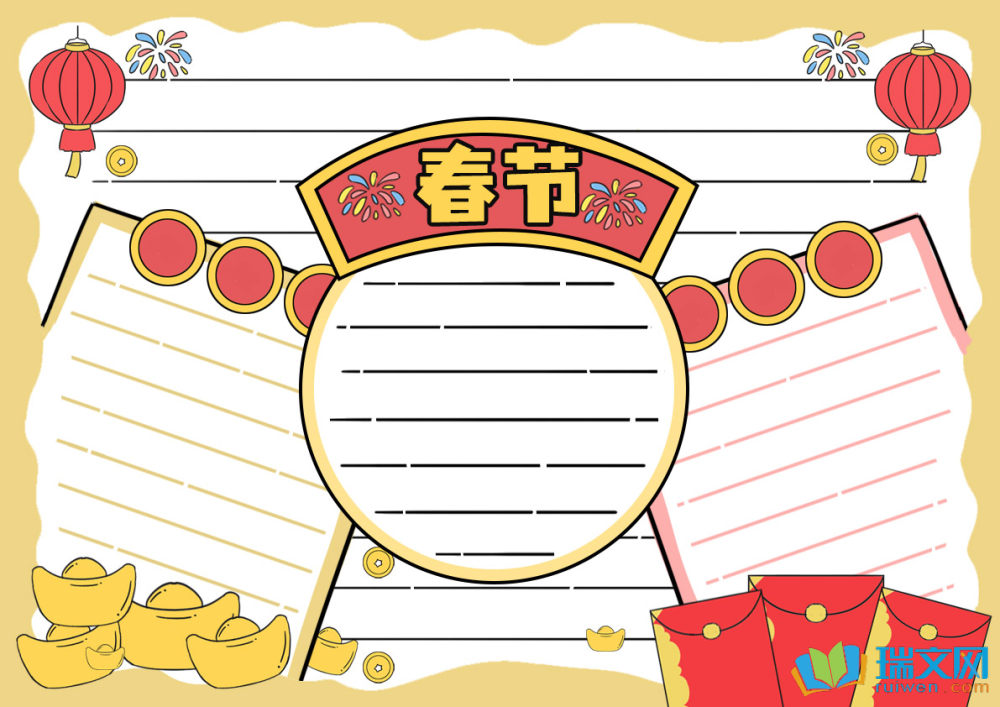
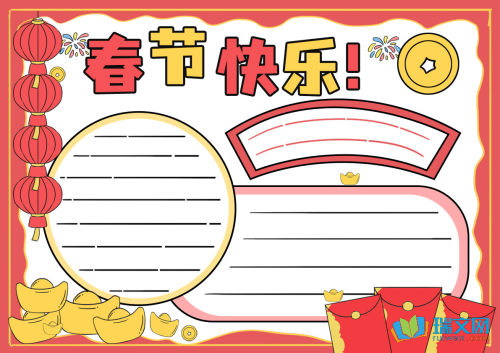
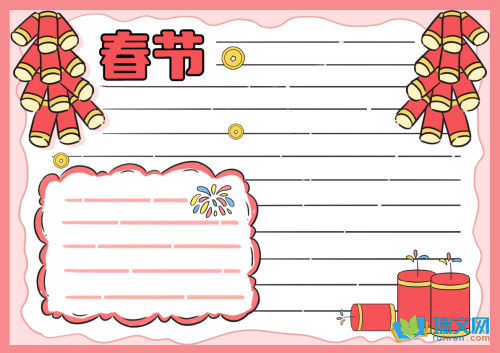
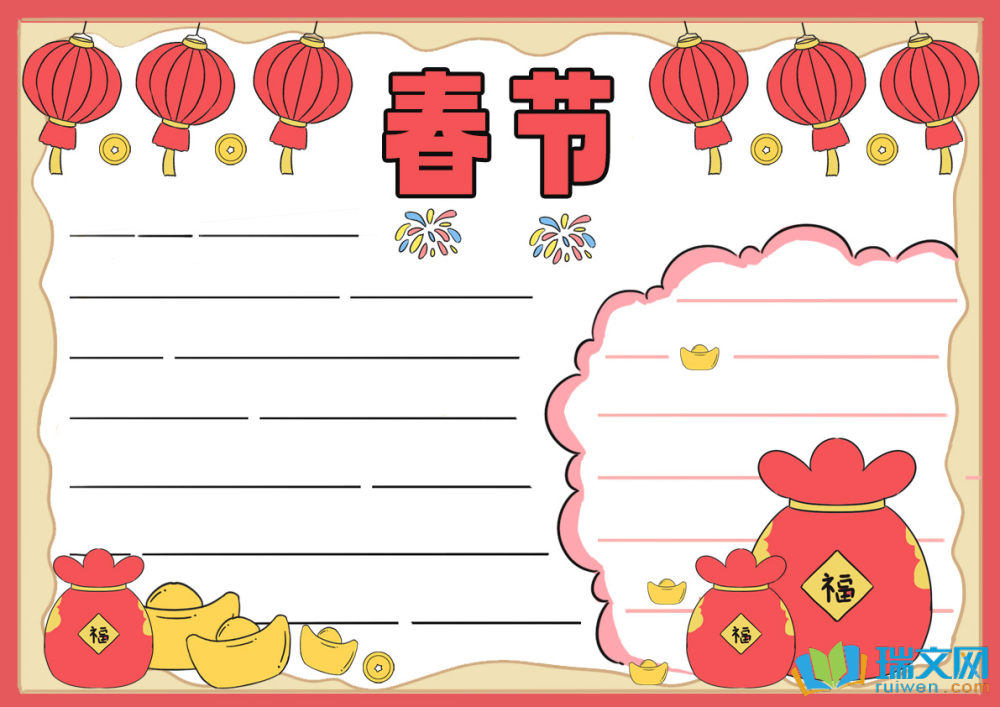
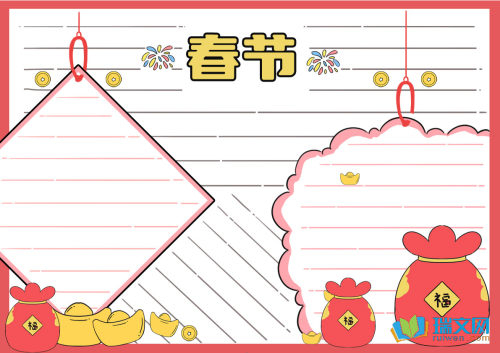
春节吃团圆饭的原因
辞年,就是在除夕吃丰盛的晚餐,俗话叫做“年夜饭”,也有的地方叫做“团年饭”、“合家欢”、“分岁酒”、“守岁酒”、“辞岁酒”。辞岁之风自晋朝以来就非常盛行,当夜骨肉团聚,儿孙绕膝,灯红酒绿,共话团圆。
除夕夜,吃团圆饭,几乎是每家每户的传统习惯。这天,在外工作的人,只要有时间,都要赶回家中,一家人团聚在一起,把最丰盛的食品拿出来,团团圆圆地吃一顿年夜饭。
在中国各地,吃团圆饭并不都一样。在南方,这顿饭一般有十几道菜,其中一定要有豆腐和鱼,因为这是汉字“富裕”的谐音。在北方,团圆饭大多是饺子,全家人一齐包,这是一种把美味肉馅包在圆形的薄面皮里的食品,包好后,用开水煮熟,加上佐料,全家人坐在桌前,热热闹闹地聚餐。“饺子”具有象征团聚的意思。
春节为什么要吃团圆饭?关于年夜饭来历的传说流传着很多有趣的传说故事。其中,流传的比较广泛的,是一则关于人们齐心协力共同抵御“年”的故事。
太古时期,有一种凶猛的怪兽,散居在深山密林中,人们管它们叫“年”。它的形貌狰狞,生性凶残,专食飞禽走兽、鳞介虫豸,一天换一种口味,人们谈“年”色变。后来,人们慢慢掌握了“年”的活动规律,它是每隔三百六十五天窜到人群聚居的地方尝一次口鲜,而且出没的时间都是在天黑以后,等到鸡鸣破晓,它们便返回山林中去了。
算准了“年”肆虐的日期,百姓们便把这可怕的一夜视为关口来熬,称作“年关”,每到这天晚上,每家每户都提前做好晚饭,熄火净灶,再把鸡圈牛栏全部拴牢,把宅院的前后门都封住,躲在屋里吃“年夜饭”,由于这顿晚餐具有凶吉未卜的意味,所以置办得非常丰盛,除了要全家老小围在一起用餐表示和睦团圆外,还须在吃饭前先供祭祖先,祈求祖先的神灵保佑,平安地度过这一夜。
吃过饭后,谁也不敢睡觉,坐在一起闲聊壮胆。不吃年夜饭是熬不过年的。所以就逐渐形成了除夕吃团圆饭的习惯。
The reasons for having reunion dinner during the Spring Festival
To bid farewell to the Chinese New Year is to have a sumptuous dinner on New Years Eve, commonly known as the "New Years Eve dinner". In some places, it is also called "reunion dinner", "family reunion", "split year wine", "Shousui wine", and "farewell wine". The custom of bidding farewell has been very popular since the Jin Dynasty. On that night, the family reunited, children and grandchildren wrapped around their knees, lights and wine were red and green, and they talked about reunion together.
Eating reunion dinner on New Years Eve is almost a traditional habit in every household. On this day, people working outside have to rush home whenever they have time. The family reunites, takes out the most abundant food, and has a round New Years Eve dinner.
Eating reunion meals is not the same across China. In the south, this meal usually consists of more than ten dishes, including tofu and fish, because this is a homophonic sound of the Chinese character "prosperity". In the north, reunion rice is mostly made of dumplings, which are made by the whole family together. This is a type of food that involves wrapping delicious meat filling in a thin round dough. After wrapping it, it is cooked in boiling water and seasoning is added, and the whole family sits at the table, having a lively meal together. Dumplings symbolize reunion.
Why do we have reunion dinner during the Spring Festival? There are many interesting legends circulating about the origin of the New Years Eve dinner. Among them, the widely circulated one is a story about people working together to resist "Nian".
In ancient times, there was a fierce monster that scattered in deep mountains and forests, and people called them "years". Its appearance is ferocious, and its nature is ferocious. It specializes in eating birds and beasts, scale insects. People turn pale when they talk about "Nian" every day. Later on, people gradually mastered the activity pattern of "Nian". It went to crowded places every 365 days to taste fresh food, and appeared after dark. When the roosters crowed, they returned to the mountains and forests.
Accurately calculating the date of the rampant New Years Eve, the people regarded this terrible night as a pass to endure, known as the "New Years Eve". On this evening, every household prepares dinner in advance, turns off the fire and cleans the stove, ties up all the chicken pens and cattle pens, seals the front and back doors of the courtyard, and hides inside to eat the "New Years Eve dinner". Due to the unpredictable meaning of this dinner, it is prepared very abundantly. In addition to gathering the whole family to eat together as a sign of harmony and reunion, it is also necessary to offer sacrifices to ancestors before eating, praying for the divine blessings of ancestors and spending the night safely.
After dinner, no one dared to sleep and sat together chatting to boost their courage. Not having the New Years Eve dinner is not enough to endure the New Year. So the habit of eating reunion dinner on New Years Eve gradually formed.
春节的来历
春节和年的概念,最初的含意来自农业,古时人们把谷的生长周期称为“年”,《说文。禾部》:“年,谷熟也:。在夏商时代产生了夏历,以月亮圆缺的周期为月,一年划分为十二个月,每月以不见月亮的那天为朔,正月朔日的子时称为岁首,即一年的开始,也叫年,年的名称是从周朝开始的,至了西汉才正式固定下来,一直延续到今天。
古时的正月初一被称为“元旦”,直到中国近代辛亥革命胜利后,南京临时政府为了顺应农时和便于统计,规定在民间使用夏历,在政府机关、厂矿、学校和团体中实行公历,以公历的元月一日为元旦,农历的正月初一称春节。
1949年9月27日,新中国成立,在中国人民政治协商会议第一届全体会议上,通过了使用世界上通用的公历纪元,把公历的'元月一日定为元旦,俗称阳历年;农历正月初一通常都在立春前后,因而把农历正月初一定为“春节”,俗称阴历年。
传统意义上的春节是指从腊月初八的腊祭或腊月二十三的祭灶,一直到正月十五,其中以除夕和正月初一为高潮。在春节这一传统节日期间,我国的汉族和大多数少数民族都有要举行各种庆祝活动,这些活动大多以祭祀神佛、祭奠祖先、除旧布新、迎禧接福、祈求丰年为主要内容。活动形式丰富多彩,带有浓郁的民族特色。
The Origin of Spring Festival
The concept of Spring Festival and Year originally came from agriculture. In ancient times, people referred to the growth cycle of grains as "year". According to "Shuowen. Hebu", "year" is also known as "grain ripening". In the Xia and Shang dynasties, the Xia calendar was created, with the cycle of the moon being round and missing as the month. A year is divided into twelve months, with the day when the moon is not seen as the new moon as the new moon. The sub hour of the new moon in the first lunar month is called the beginning of the year, which is also known as the year. The name of the year started from the Zhou Dynasty and was officially fixed until the Western Han Dynasty, and has continued until today.
The first day of the first lunar month in ancient times was called "New Years Day". It was not until the victory of the Xinhai Revolution in modern China that the Nanjing Provisional Government, in order to comply with the agricultural season and facilitate statistics, stipulated the use of the summer calendar in the public, and implemented the Gregorian calendar in government agencies, factories, schools, and organizations. The first day of the first lunar month in the Gregorian calendar was called New Years Day, and the first day of the first lunar month in the lunar calendar was called Spring Festival.
On September 27, 1949, the Peoples Republic of China was established. At the first plenary session of the Chinese Peoples Political Consultative Conference, the universal Gregorian calendar era was adopted, and the first day of the first lunar month was designated as New Years Day, commonly known as the Gregorian year; The first day of the first lunar month is usually around the beginning of spring, so the first day of the first lunar month is always referred to as the "Spring Festival", commonly known as the lunar year.
In the traditional sense, the Spring Festival refers to the festival held on the eighth day of the twelfth lunar month, or the festival held on the 23rd day of the twelfth lunar month, until the fifteenth day of the first lunar month, with New Years Eve and the first day of the first lunar month as the climax. During the traditional Chinese New Year holiday, the Han and most ethnic minorities in China hold various celebration activities, most of which focus on worshipping gods and Buddhas, paying homage to ancestors, demolishing the old and renovating the new, welcoming jubilees and blessings, and praying for a bountiful year. The activities are diverse and have strong ethnic characteristics.
春节英语作文
Im looking forward to New Years day, I wish my hope, the annual Spring Festival come at last!
Chinese New Year! One day, every family in stick couplets, eat dumplings. Couplet is I put in my house, I first put paste, the reverse of the couplets on the door, specialty scan again let it stick close dont let it fall. Linked to stick out and then open the bottom allied, just way, couplet posted out, looked at the gate red couplets, flattered me, felt great to read.
Our family reunion dinner together "jiaozi" grandmother and mother is responsible for making dumplings, I am in charge of the pot, dad is responsible for make dumplings. Delicious dumplings to table serve fish or fowl, my mouth water three thousand feet, will leave when I picked up the chopsticks to eat, a bowl of enough to two bowls, two bowls of enough to three bowls to eat.
In the evening, I go to set off firecrackers and ed into a tree, a light, ran "or" the voice. Put out, I found that Fried missed, ha ha, tease the hell out of me.
Hometown Spring Festival really let a person want to stay.
我很盼望过年,我盼啊盼啊,终于一年一度的春节来啦!
过年啦!人们高兴得不得了,家家户户都在贴对联,吃饺子。我家的对联是我贴的,我先把对联的反面抹上浆糊,贴到门口,再拿手扫一扫让它贴紧别让它掉下来。上联贴完了就开时贴下联,照刚才的方法,对联贴完了,看着大门口红红的对联,我心里美滋滋的,不由得念起来。
我们家一起吃团圆饭“饺子”奶奶和妈妈负责包饺子,我负责下锅,爸爸负责捞饺子。香喷喷的饺子上桌了鸡鸭鱼肉应有尽有,我口水直流三千尺,我拿起筷子就开时吃,一碗不够来两碗,两碗不够来三碗非吃饱不可。
到了傍晚,我赶紧去放鞭炮,插到树上,一点燃,赶紧跑“噼里啪啦”的声音发出来了。放完了,我发现盆炸漏了,哈哈,逗死我了。
家乡的春节真让人留恋。
春节英语祝福语
1. Wishing you many future successes
祝你今后获得更大成就。
2. Good luck in the year ahead!
祝吉星高照!
3. I am here to say Happy New Year to everyone!
我给大家拜年了!
4. Lucky money for you
这是给你的压岁钱。
5. Good luck, good health, hood cheer I wish you a happy New Year 祝好运健康佳肴伴你度过一个快乐新年。
6. I hope you have a most happy and prosperous New Year
谨祝新年快乐幸福,大吉大利。
7. With the compliments of the season
祝贺佳节。
8. Seasons greetings and best wishes for the New Year
祝福您,新年快乐。
9. Please accept my seasons greetings
请接受我节日的祝贺。
10. Please accept my sincere wishes for the New Year I hope you will continue to enjoy good health
请接受我诚挚的新年祝福,顺祝身体健康。
11. Allow me to congratulate you on the arrival of the New Year and to extend to you all my best wishes for your perfect health and lasting prosperity
恭贺新禧,祝身体健康事业发达。
12. Best wishes for the holidays and happiness throughout the New Year
恭贺新禧,万事如意。
春节习俗英语
小年通常在农历新年前一周,今年是2月4日。它也被称为灶神节,掌管着每家每户的道德品质。Little New Year (Xiaonian), usually a week before the lunar New Year, falls on FEB 4 this year. It is also known as the Festival of the Kitchen God, the deity who oversees the moral character of each household.
祭祀灶神Offer sacrifices to Kitchen God
小新年最独特的传统之一是烧毁厨房神的纸像,神就可以飞升上天,报告这个家庭过去一年所有的事情。然后,通过在炉灶旁粘贴他的新纸质图像,欢迎厨房神回到家里。从这个方面来看,“厨神”将监督和保护家庭一年。In one of the most distinctive traditions of the Little New Year is the burning of a paper image of the Kitchen God, dispatching the gods spirit to Heaven to report on the familys conduct over the past year. The Kitchen God is then welcomed back by to the home through the pasting of a new paper image of him beside the stove. From this vantage point, the Kitchen God will oversee and protect the household for another year.大多数的祭品都是各种各样的糖果。据说这样可以封住灶神的嘴,鼓励他升天报告时只说这家人的好话。Most of the offerings are sweets of various varieties. It is thought that this will seal the Kitchen Gods mouth and encourage him to only say good things about the family when he ascends to heaven to make his report.
大扫除Spring Cleaning
腊月24 The 24th day of the 12th month in Lunar Calendar
根据中国民间的信仰,在一年的最后一个月,鬼神们必须选择返回天堂或留在人间。人们认为,为了保证鬼神们的及时离开,人们必须彻底打扫自己的身体和住所,直到最后一个抽屉和橱柜。According to Chinese folk beliefs, during the last month of the year ghosts and deities must choose either to return to Heaven or to stay on Earth. It is believed that in order to ensure the ghosts and deities timely departure people must thoroughly clean both their persons and their dwellings, down to every last drawer and cupboard. 中国家家户户都要进行大扫除,扫除旧物,为新年做准备。Families throughout China undertake a thorough house cleaning, sweeping out the old in preparation for the New Year.
做豆腐Make tofu
腊月25The 25th day of the 12th month in Lunar Calendar
当然,这是一个象征性的原因。汉语里面的豆腐的腐字与福(幸福)和富(财富)的发音相似。制作豆腐还意味着在新的一年里迎接幸福和丰收。course, there is a symbolic reason. The Chinese word腐has a similar pronunciation with the word of福( fu, happiness) and富( fu, wealth). Making tofu also means welcoming happiness and a good harvest in the new year.如今,人们将不再自制豆腐,他们还有许多其他食物选择。经常看到中国人将福字样的剪纸作品倒置在窗户或门上。通过这样做,他们实际上表达了欢迎家庭幸福的相同想法。Nowadays, people will not make their own tofu and they have many other choices of food. It is very common to see Chinese people pasting a paper cutting work of the Chinese character of福up side down on the window or door. By doing this, they actually express the same idea of welcoming happiness to their house.
割年肉Buying Pork for the New Year
腊月26The 26th day of the 12th month in Lunar Calendar
在古代,物资匮乏,不可能总是吃肉。虽然现在买肉很方便,但习俗仍然是保留了下来了。In ancient times, the economy was underdeveloped and it was not always possible to eat meat. Although it is very convenient to buy meat now, the customs are still retained.
洗疚疾Bathing?and?Going?to?the?Market
腊月27The 27th day of the 12th month in Lunar Calendar
在这一年年底,沐浴和去除污物的习俗起源于古代祭祀之前的快速沐浴。人们可以洗个澡,清新一下,以迎接新的一年。At the end of the year, the custom of bathing and removing filth originated from the fast bathing before the ancient sacrifices. people can refresh themselves by taking a bath, clean and refreshing to welcome the new year.
贴花花Paste paper-cuts to windows
腊月28The 28th day of the 12th month in Lunar Calendar
旧的春联和剪纸都被取下来,新的窗花、新年海报和吉祥的装饰品都被贴上。couplets and paper-cuts from the previous Spring Festival are taken down, and new window decorations, New Years posters, and auspicious decorations are pasted up.
蒸馒头Steamed bread
腊月29The 29th day of the 12th month in Lunar Calendar
【春节英语手抄报素材】相关文章:
春节英语手抄报素材01-29
春节的英语手抄报素材02-06
春节英语手抄报资料素材03-23
国庆英语手抄报素材10-11
春节的手抄报素材10-15
春节手抄报素材01-30
春节手抄报素材03-13
五年级春节英语手抄报素材03-23
圣诞节的英语手抄报素材12-25
母亲节的手抄报英语手抄报素材05-17